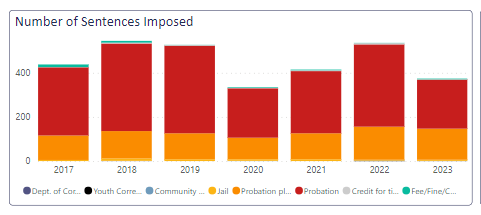A PROSECUTOR'S EXPERIENCE WITH SEXUAL ASSAULT CRIMES
Prosecutors handle criminal charges related to sexual offenses that may be misdemeanor or felony charges. Some of these charges may involve sexual conduct toward another person, online offenses targeting children, or offenses that involve child sexual exploitation material (sometimes referred to as “CSAM” or “child porn”). To convict anyone of a criminal offense, the prosecution must prove the crime beyond a reasonable doubt. A defendant is presumed innocent until that burden of proof has been established.
Prosecutors find these cases to be complex, involve very sensitive matters, and are often considered high-stakes cases because of the consequences that may follow. Great care is taken with victims to ensure they have access to community resources. The prosecutors handling felony sex offenses are very experienced, averaging 12-15 years of experience with complex cases.
SEX OFFENSES CHARGED 2023
- 52 felony sex offense cases were filed. (15 sexual assault on child, 16 child sexual exploitation, 2 Incest, 2 enticement of a child, 3 internet luring, 5 prostitution of a child, 2 felony indecent exposure because of prior offenses, 1 felony unlawful sexual contact, and 6 sexual assaults).
- 24 misdemeanor cases were filed in 2023. (9 unlawful sexual contact, 15 indecent exposure).
- This information does not include the total number of charges in any single case or the number of victims that are part of any single case.
WHAT ARE SEX OFFENSES?
- The definition of sexual offense is defined differently for specific statutes. In general, sexual offenses mostly involve: sexual contact for the purpose of sexual gratification or abuse, sexual penetration or sexual intrusion without consent or when a victim is incapable of consenting based on age or the victim’s condition, internet contact with a child for the purpose of sexual conduct, or indecent exposure with an act exposing genital causing affront/alarm or to satisfy sexual desire, indecent exposure with an act of masturbation to cause alarm.
- Some sexual acts (sexual contact, penetration, intrusion) are prohibited by law based on the difference in age between a victim and an offender whether or not it is a consensual act. This means that consent is not a defense when there is a defined difference between the age of the victim and the offender. Some states refer to this as statutory rape. An example of this is in Colorado is Sexual Assault on Child, Sexual Assault on Child Position of Trust, Incest.
DEMOGRAPHICS
AGE OF OFFENDERS
Of the 52 filings for felony sexual offenses, twenty-eight involved adults who were 36 years of age or older, twelve were 26 to 35 years old, six were ages 18-25 years old, and six of these cases involved juvenile offenders.
CHARACTERISTICS OF DEFENDANTS AND VICTIMS
In 2022, all offenders charged for felony sex offenses were male. 82% of the victims were female, 16% were male, and 2% were unknown (which could include not reported).
SENTENCING/OUTCOMES
Those charged with felonies face the potential for felony convictions and may include sentencing options such as probation, community corrections or prison. Because of the seriousness of these charges, the outcome of a felony charge rarely results in a reduction to a misdemeanor offense, but may involve a reduction to a plea for a lesser felony conviction. The prosecutors who handle these cases recognize the paramount interest of public safety and protection of children.
SEX OFFENDER REGISTRATION
Convictions for unlawful sex offenses require individuals to register as a sex offender. Sex offender registration is not imposed as a punishment, but as a measure of community safety and monitoring where offenders reside. Crimes listed under C.R.S. 16-22-102(9) are required to register as a sex offender.
An offender who has been designated by a judge to be a “sexually violent predator” requires community notification requirements and more intense reporting requirements.
If any offender pleads guilty and receives a deferred judgment (meaning the conviction is not yet entered, but the defendant is required to submit to supervision and treatment), that person will also have to register as a sex offender during any supervision.
The Colorado Sex Offender Registry can be found here: https://apps.colorado.gov/apps/dps/sor/
FREQUENTLY ASKED QUESTIONS:
WHAT IS AN INDETERMINATE SENTENCE?
A conviction for some felony sexual offenses, such as Sexual Assault on a Child, requires lifetime supervision, which legally is referred to as “indeterminate” sentencing. This means a person convicted of this specific type of offense is subject to supervision by probation or parole for the rest of their lives. C.R.S. 18-1.3-103(5)(a) provides a list of offenses that require indeterminate sentencing. An offender does have the ability to discharge from that obligation depending on their success in treatment, rehabilitation, stability in the community, and reduction of risk of another sex offense (at 10 years for a Class 4 felony, at 20 years for a Class 2 or 3 felony).
IS PRISON REQUIRED FOR FELONY SEX OFFENSE CONVICTIONS?
Some felony sex charges may contain aggravating factors that may justify an offender being sentenced directly to prison without a probation option. Examples of this include “pattern of abuse” (more than one act of sexual assault on a child), sexual penetration or intrusion, causing bodily injury to a child or the use of force, threats or intimidation. These types of cases require prison based on the aggravating circumstances and the victim and society.
HOW LONG DOES IT TAKE TO PROSECUTE SEX OFFENSES?
Because felony sexual offenses carry such significant penalties and consequences, these cases take longer than other types of crimes to reach an outcome in the court system. These cases are likely to have many more court hearings than non-felony sex offense cases because the cases have more complex issues.
Felony Sex Offenses
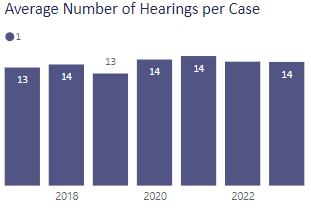
Non-Felony Sex Offenses
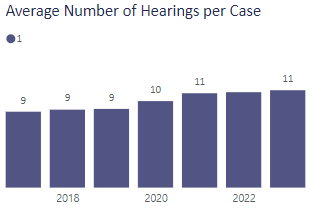
If a felony sex offense proceeds to trial, the number of hearings and timeliness to reach a disposition is significantly higher. In preparation for a trial, the legal issues and determination of what evidence may be admissible in trial can become very complex and highly litigated taking more court time. The prosecutors in the District Attorney’s Office are conscientious of making a good record to protect victims, protecting the rights of an offender including the right to effective assistance of counsel, and protecting the integrity of a conviction in the event that the offender is convicted at trial. An appeal is likely to follow any conviction after trial. Appeals can generally take two to four years to reach a conclusion on the appellate level.
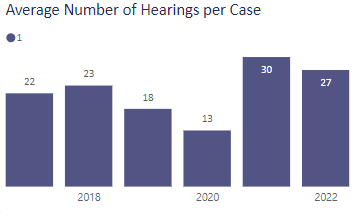
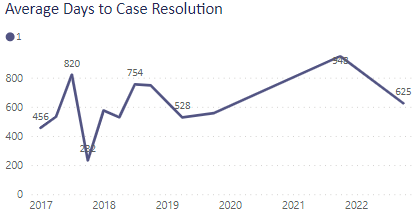
GUILTY PLEAS
A plea agreement means the prosecution and defense have come to an agreement on what type of charge an offender will plead guilty to in order to resolve the case. There are many factors that weigh into a plea agreement, including but not limited to:
- the length of the abuse,
- the type of abuse,
- the age of the victim,
- the age of the defendant,
- the defendant's position of trust,
- any input from the victim and parents (if the child is under the age of 18),
- any injury to the victim,
- the strength of the evidence,
- any prior criminal history of the defendant, and
- any prior sexual offense history of the defendant and previous sentences imposed.
If an offender chooses to plead guilty, that is likely to happen much earlier than a trial. A plea of guilty means the offender pleads guilty to what has been agreed upon in a plea agreement. The plea agreement is an agreement reached between the prosecutor and the defense.
With a plea of guilty, the victim will not need to testify, other witnesses will not need to testify, and an appeal is not likely to follow. A victim will have the opportunity to explain to the court how this crime has impacted them, without being cross-examined.
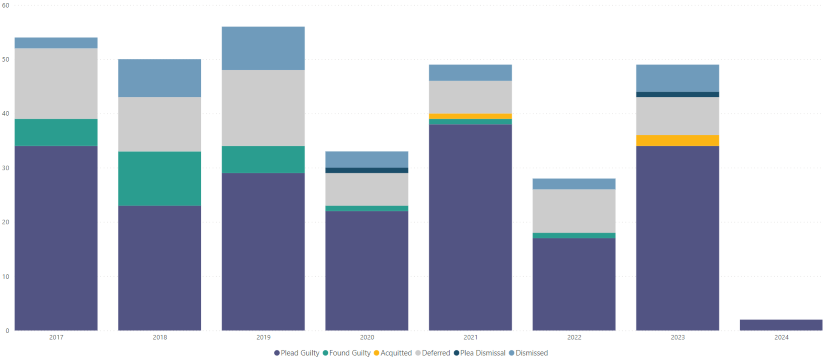
SENTENCING
Felony sexual offenses carry mandatory consequences that may include sex offender registration, offense-specific evaluation and treatment by certified providers approved by the Sex Offender Management Board, and some offenses may carry prison. Felony sexual offenses are taken very seriously by the District Attorney’s Office, which is evident in the types of sentences imposed here in Mesa County.
A significant number of felony sex offenders are sentenced to the Department of Corrections.
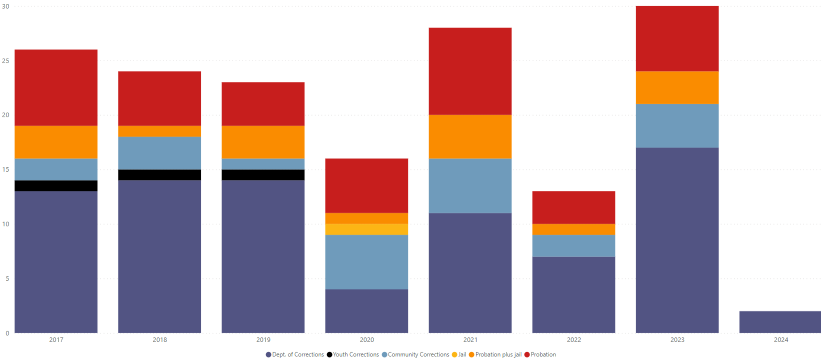
MISDEMEANOR SEX OFFENSES
Misdemeanor sex offenses do not carry prison time, although those crimes may carry possible jail time in the Mesa County Detention facility. Because these offenders are likely to remain in the community, probation is a critical resource often integrated into plea agreements to ensure the offender is supervised.
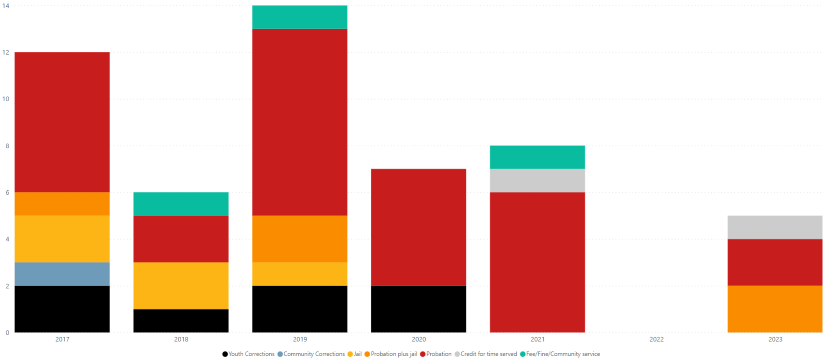
WHAT IS THE VICTIM RIGHTS AMENDMENT (VRA)?
The District Attorney’s Office is mandated by law to follow the Victim Rights Amendment to ensure that victims are honored and protected within the court system in a manner no less vigorous than the protection afforded to criminal defendants. C.R.S. 24-4.1-301. While prosecutors are not attorneys for the victim, the Victim Rights Amendment directs prosecutors to engage in “meaningful consultation” about a plea agreement before an agreement is reached, so long as the victim provides the DA’s Office with his/her phone number and contact information. Victims have the right to be present at any critical stage of the proceedings, which also allows for a victim or a minor victim's parents to be present even during trial.
Victims may perceive that the rights of defendants often seem to compete against the rights of victims. Prosecutors work diligently to make sure victims are seen and heard. Dan Rubinstein, the elected District Attorney in Mesa County, has worked persistently to expand the Victim Witness unit with additional staff to ensure that his office prioritizes victims and services to victims. The graph below shows the expansion of staff in the Victim Witness unit since 2016.

The District Attorney’s Office also employs a very special dog named Rachael. Rachael is used as often as possible and attends interviews with child victims, meetings with victims, therapy sessions, and court appearances with victims which often include courtroom testimony. Prosecutors and our Victim Specialists will also introduce victims, especially child victims, to the courtroom to help make them comfortable before trials. Rachael is often used during this experience.

The graph below demonstrates the major strides that have been taken to consult with a victim as soon as possible.
AVERAGE NUMBER OF DAYS TO VICTIM CONTACT
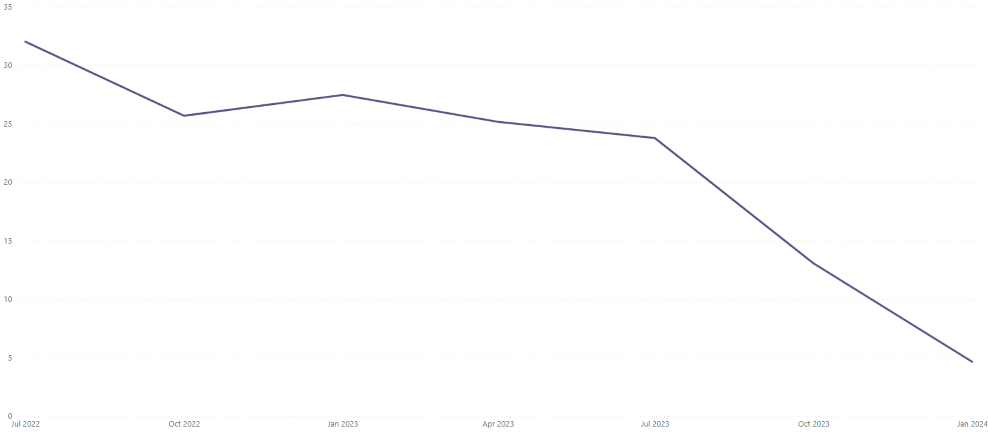
Domestic Violence in Mesa County
Overview
In 2022 the District Attorney’s Office formed the Domestic Violence Response Team (DVRT). Through grant funding, we were able to bring on a Coordinator for this team that provides a more comprehensive look into complex Domestic Violence cases. DVRT is a multi-disciplinary team of Investigators, a specialized Domestic Violence Coordinator, Victim Specialists, Deputy District Attorneys, Paralegals, and other community partners. DVRT reviews domestic violence cases to provide additional investigation, risk assessments, and needs assessments to improve the overall continuity of care and quality of prosecution in Domestic Violence cases.
What is Domestic Violence?
Colorado Revised Statute §18-6-800.3(1) defines Domestic Violence as: "an act or threatened act of violence upon a person with whom the actor is or has been involved in an intimate relationship.” This definition also includes non-violent crimes “when used as a method of coercion, control, punishment, intimidation or revenge” against an intimate partner.
“Intimate relationship” means a relationship between spouses, former spouses, past or present unmarried couples, or persons who are both the parents of the same child regardless of whether the persons have been married or have lived together at any time.
In the state of Colorado, a police officer is mandated to arrest an individual if there is “probable cause to believe a crime of domestic violence was committed.”
Domestic Violence cases are part of the Victim Rights Act. As such, victims of Domestic Violence have specific rights that are afforded to them under the Colorado Constitution and Colorado statutes.
The Victim Rights Act ensures that crime victims are treated with fairness, respect, and dignity and that they are free from intimidation, harassment, and abuse. The VRA also helps to ensure that victims are informed of critical stages of the criminal justice process and that they may be present for, and heard, at certain stages as well. Additional information can be found at
https://dcj.colorado.gov/dcj-offices/victims-programs/crime-victim-rights-act-vra.
Case Resolution
In 2022, the District Attorney’s Office resolved 249 felony Domestic Violence cases. In 2023, 234 felony Domestic Violence cases were resolved. According to the graph below, the outcomes of felony Domestic Violence cases appear to be fairly consistent year to year.
Below is a breakdown of how felony Domestic Violence cases are resolving in our district:

*Plea dismissal- It is not uncommon for defendants to have multiple criminal cases going on at the same time. A defendant may be able to resolve such a situation by pleading guilty to some of the cases in exchange for other charges being dismissed. So, if a defendant pleads guilty to a case in exchange for the dismissal of two others, the case plead to would be categorized as plead guilty, whereas each of the cases dismissed would be categorized as “plea dismissals”.
In 2022, the District Attorney’s Office resolved 506 misdemeanor Domestic Violence cases. In 2023, 475 misdemeanor Domestic Violence were resolved. According to the graph below, the way misdemeanor Domestic Violence cases are resolved appears to be fairly consistent year to year.
Below is a breakdown of how misdemeanor Domestic Violence cases are resolving:

Timeliness
Felony Domestic Violence Case Resolution
The graph below shows the average number of hearings completed to resolve felony Domestic Violence cases. Since 2017, our trend shows a slight increase in the number of hearings to resolve these matters, going from 9 to 11. This upward trend is consistent with other felony charging numbers within the District Attorney’s Office.

Misdemeanor Domestic Violence Case Resolution
The graph below shows the average number of hearings completed to resolve misdemeanor Domestic Violence cases. The trend shows a slight increase in 2021 and 2022, however, the 2023 number shows a decrease back to an average of 7 hearings per case.
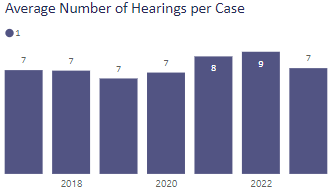
Domestic Violence Sentencing
Whether misdemeanor or felony, all Domestic Violence convictions require Domestic Violence treatment as directed by an evaluation, unless the sentence is prison. As demonstrated by the charts below, there are numerous sentencing options available and imposed on Domestic Violence cases, however, the possible consequences become more significant for felonies, with the addition of Community Corrections and prison as options.
Prison and Community Corrections are not sentencing options for misdemeanors. Consequently, rehabilitation and behavior change, not punishment, are the primary driving factors for misdemeanor sentencing. Once a Domestic Violence offender has three Domestic Violence convictions, habitual Domestic Violence charges could be filed.
Felony Domestic Violence Sentences
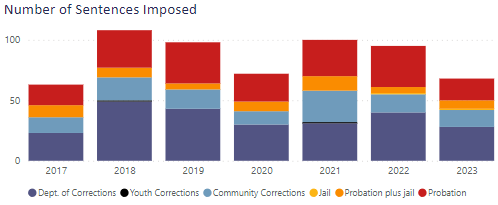
Misdemeanor Domestic Violence Sentences
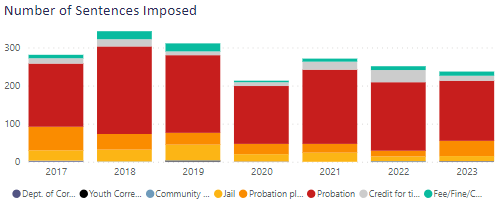
Demographics


*These statistics do not account for unreported incidents.
Understanding that Domestic Violence offenders pose a community safety risk, the District Attorney’s Office is diligently reviewing this data to better resolve these cases in a swift and just manner. We work with our local law enforcement and DVRT Investigators to ensure Domestic Violence cases can be proven beyond a reasonable doubt. We work with DVRT attorneys, victim specialists, and paralegals to provide the best possible outcome for victim safety, offender accountability, and treatment. Through the collaboration between the DVRT and agency/community partners, the goal is to make informed and thoughtful decisions on when and how to best resolve Domestic Violence cases.
DUIs in Mesa County
Felony/Misdemeanor DUIs in Mesa County
A DUI (Driving Under the Influence) or DWAI (Driving While Ability Impaired) charge is generally a misdemeanor in Colorado. A felony DUI is charged when someone has three or more prior DUI convictions or a defendant caused an accident that killed or injured another person while under the influence of alcohol or drugs. Upon a fourth conviction, a defendant may be sentenced to prison. The District Attorney deems these cases to be among the most serious offenses in Mesa County, as public safety is paramount.
Since 2017, felony DUI case filings have ranged from 4 cases at the lowest to 21 cases at its highest (on a quarterly basis). The data has remained fairly consistent with an average of 10 cases filed at any given quarter.
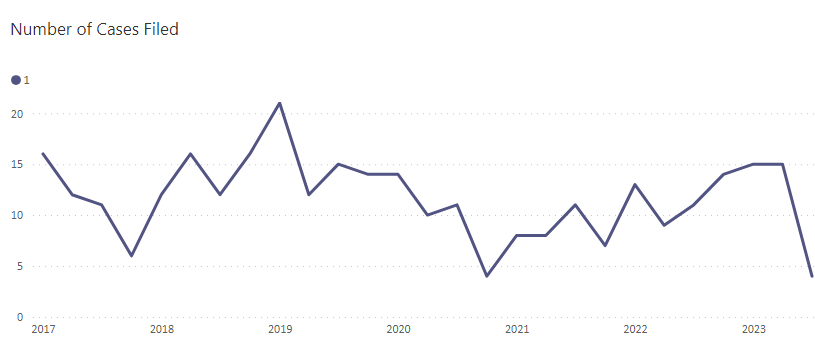
In 2022, there were 47 felony DUIs charged in Mesa County. As of September 30, 2023, our office has charged 34 felony DUIs. This is consistent with 2022.
Driving while under the influence occurs when a person drives a motor vehicle when his/her blood alcohol content (BAC) is 0.08 or more at the time of driving or within two hours of driving, and therefore was substantially impaired by drugs and/or alcohol. Driving While Ability Impaired occurs when a person drives a motor vehicle while impaired to the slightest degree, or between a .05 and a .08 BAC. In 2022, there were 559 misdemeanor DUIs/DWAIs charged in Mesa County. In 2023, 401 misdemeanor DUI/DWAI cases have been charged as of September 30, 2023. This is trending to end the year consistent with 2022.
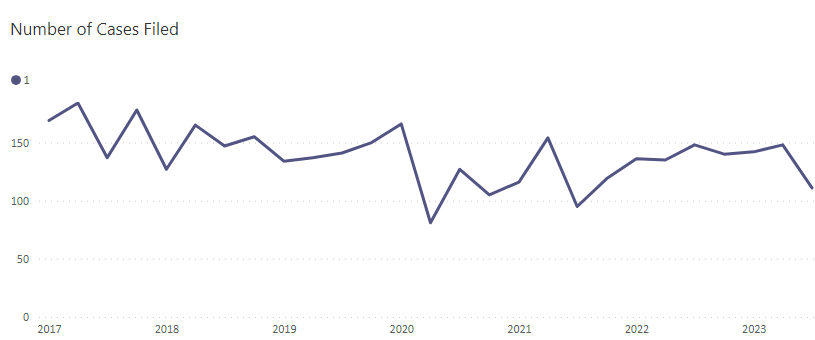
Case Resolution of DUIs
In 2022, the District Attorney’s Office resolved 46 felony DUI cases. This year, we have resolved 28 cases as of September 30, 2023. This coupled with the amount of felony DUI cases we have charged (34 this year) means there is a slight backlog in the system of unresolved felony DUIs. The District Attorney’s Office is very careful in charging felony DUIs, as well as resolving DUI cases in general. Very rarely are these cases dismissed outright. District Attorney Dan Rubinstein believes these crimes compromise public safety and these offenders should be held accountable.
Below is a breakdown of how felony DUI cases are resolving:
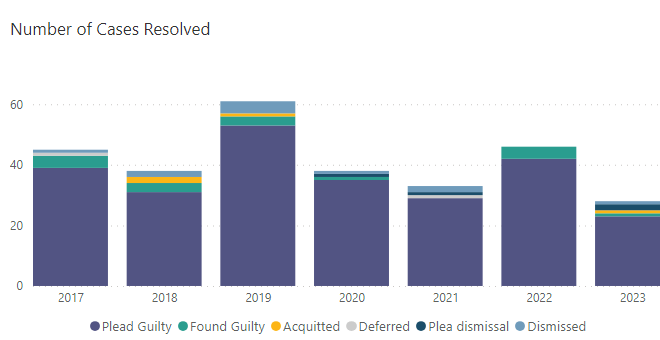
Timeliness
Resolving cases in an appropriate amount of time relieves our staff and Courts of unnecessary time spent working on a resolution.
Felony DUI Case Resolution:
The graph below shows the average number of hearings completed to reach a resolution in felony DUI cases. Since 2017, our trend shows we are increasing the number of hearings to resolve these matters from 11 to 14 hearings per case.
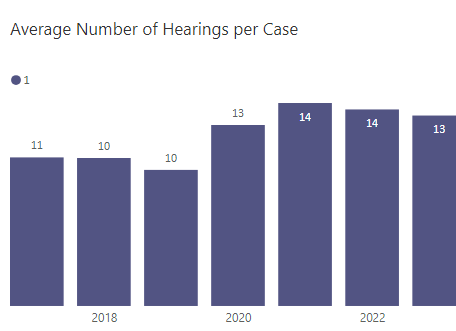
The graphs below shows the average and median number of days it is taking us to reach a resolution in felony DUI cases. In January, 2017 it was taking 225 days to resolve these cases. In 2023 (as of September 30th) it is taking 335 days to resolve.
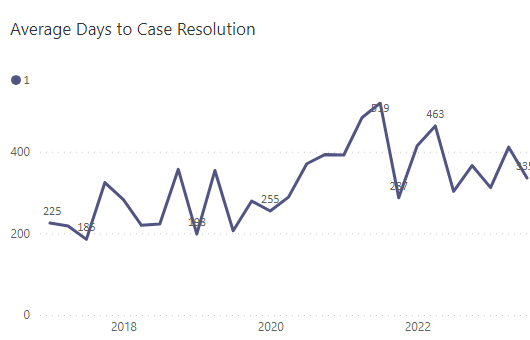
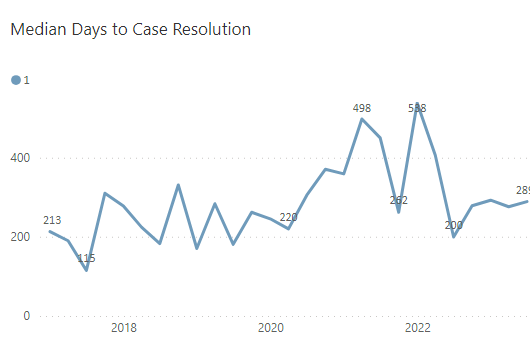
When faced with this data we began to investigate why this is taking us longer. While we can’t say with certainty any one factor is driving this trend, we can opine that the following factors impact the amount of time it takes to resolve a felony DUI case:
- When law enforcement arrests on a DUI stop, the blood samples are sent to a lab for testing. Delays occur during this lab analysis. After the results are made available, the Deputy DA provides the results to the defendant and the case begins moving again.
- Body-worn Camera is part of every case. It takes a significant amount of time to review the footage obtained by the officers’ cameras.
- Our policy is to take a hard line on repeat DUI offenders as we believe public safety is most important. When we cannot offer an attractive plea offer to defendants we are most likely going to be set for trial and a jury will decide the defendant’s guilt or innocence.
- In our jurisdiction, it is our office policy not to offer DUI offenders Diversion or a Deferred Judgment and Sentence (which give the Defendant a chance to resolve their case without a conviction). Some jurisdictions in Colorado allow these options for this type of case; we do not in Mesa County.
- If the Defendant is out of custody (bonded out of jail) any trial setting may be continued for those defendants in custody awaiting trial.
- Staff turnover. When prosecutors leave or switch caseloads, it takes a while for the new prosecutor to familiarize themselves with these new cases and this slows down time to resolution. The same holds true when the defendant’s attorney changes during the case.
Misdemeanor DUI Case Resolution:
The graph below depicts the average number of court hearings it takes to resolve a misdemeanor DUI case.
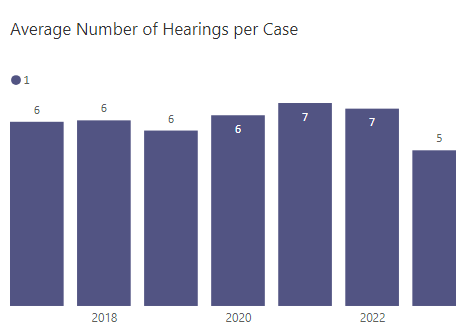
As you can see, it is significantly different from felony DUIs both in average hearings per case (5 hearings for misdemeanors and 13 for felonies) and days to resolution (168 days compared to 335 for Felony DUI cases). Misdemeanor DUI cases may resolve more quickly for various reasons: streamlined procedure in place for all misdemeanor DUIs, offenders with misdemeanor DUIs may not be represented by an attorney and appear pro se, and more risks and consequences at stake for felony DUI offenses.
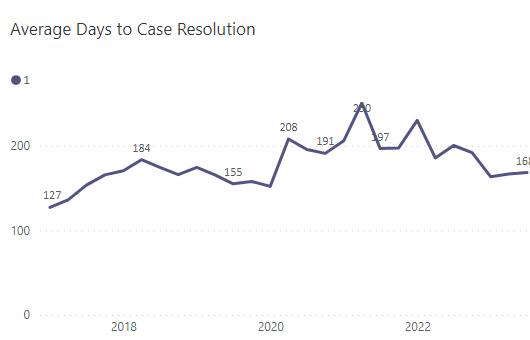
DUI Sentencing
As demonstrated by the charts below, numerous sentencing options are available and imposed on felony DUI cases: probation, jail, community corrections, and prison. The consequences become more significant for felony DUIs. For misdemeanor DUI prosecution, rehabilitation is a major focus.
Felony DUI Sentences

Misdemeanor DUI Sentences
